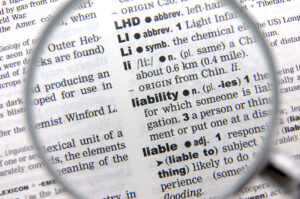
In personal injury law, one of the most important questions is who is legally responsible for an accident or injury. This concept is known as liability. It forms the foundation for nearly every personal injury case. Without proving liability, you cannot recover damages—even if your injuries are severe and your expenses are overwhelming.
Understanding liability is essential for anyone considering a personal injury claim. Below, we explain what liability means, why it matters in personal injury cases, how it can be proven, and what happens when it is disputed. We also discuss how Indiana’s laws address situations where an injured person may be partly at fault.
What is Legal Liability?

In simple terms, liability is legal responsibility for harm caused to another person. If someone’s careless, reckless, or intentional actions cause another person to be injured, they may be held liable for the resulting damages. Liability is the legal mechanism that allows victims to recover compensation for medical bills, lost income, pain and suffering, and other losses.
Think of liability as a bridge between an accident and the compensation that makes recovery possible. Without liability, victims would be left on their own, even if they did nothing wrong. With liability, the costs of an injury are shifted onto the party who caused the harm.
Here are some real-world examples:
- A driver who runs a red light and causes a car crash may be liable for the injuries of others involved.
- A property owner who fails to clean up a spill in a grocery store aisle may be liable when a shopper slips and falls.
- A company that sells a defective product may be liable when that product causes harm.
Without a finding of liability, victims are left to bear the financial and personal burden of an accident on their own.
Why is Liability So Important in Personal Injury Cases?
Liability is at the heart of every personal injury claim. It determines who must pay for the damages. Establishing liability ensures that the financial responsibility for injuries falls on the party who caused the harm, not on the victim.
Liability also matters because it gives structure to the claim process. When liability is clear (e.g., in a rear-end collision where one driver was texting), it is often easier to negotiate a fair settlement. But when liability is disputed, the case can become a battle of evidence. Each side will have the opportunity to present its version of events. This is why having a skilled attorney can be important for your recovery.
How Do You Prove Liability in a Personal Injury Case?
Proving liability generally requires showing that another person or entity was negligent, reckless, or otherwise at fault for the accident. In Indiana, negligence is the most common basis for liability.
To prove negligence, you must establish four elements:
- Duty of Care – The defendant had a legal obligation to act with reasonable care. For example, drivers must obey traffic laws, and property owners must maintain safe premises.
- Breach of Duty – The defendant failed to meet this duty, either through action or inaction.
- Causation – The defendant’s breach directly caused the accident or injury.
- Damages – The victim suffered actual harm, such as physical injuries, financial losses, or emotional distress.
Proving these elements often requires extensive evidence. Lawyers gather police reports, medical records, surveillance footage, witness statements, and expert testimony to demonstrate liability. For complex cases, such as multi-vehicle crashes or premises liability claims, they may also work with accident reconstructionists and safety experts.
What Happens When Liability is Disputed?
In many personal injury cases, liability is not straightforward. The other party may deny wrongdoing or argue that something else caused the injury. Insurance companies, in particular, are skilled at raising doubts. They may try to argue that your injuries were pre-existing, that you exaggerated your symptoms, or that you caused the accident yourself.
When liability is disputed, cases often involve:
- Extensive Investigations – Attorneys may work with accident reconstruction specialists or security experts to determine what really happened.
- Insurance Company Tactics – Insurers may try to minimize payouts by blaming the victim or downplaying injuries.
- Litigation – If settlement negotiations fail, the case may go to court. This is where a judge or jury decides who is liable and how much compensation is owed.
When you select an attorney, you want an experienced litigator. When liability is challenged, you need to be prepared to take cases to court and fight aggressively for your case. An aggressive approach often pushes insurers to settle fairly, rather than risk facing a trial in court.
Can You Recover Damages if You’re Partially to Blame in Indiana?
Yes, but with limitations. Indiana follows a modified comparative fault rule. Under this system, you can still recover compensation as long as you are not more than 50% at fault for an accident. However, your recovery will be reduced by your percentage of fault.
For example:
- If a jury finds you 20% at fault in a car accident and your total damages equal $100,000, your recovery would be reduced to $80,000.
- If you are found 51% or more at fault, you are barred from recovering any compensation.
This makes it especially important to work with an attorney who knows how to minimize claims of comparative fault and highlight the negligence of the other party.
Contact an Experienced Personal Injury Lawyer in Indiana Today
Liability is the foundation of every personal injury case. It determines who is legally responsible, who must pay damages, and how much compensation victims can receive. Proving liability requires careful investigation, strong evidence, and skilled legal advocacy. This is especially important when the other side disputes fault or tries to blame the victim.
At Rob King & Associates, Trial Lawyers, we bring over 40 years of combined legal experience to every case. We’ve helped clients recover hundreds of millions of dollars by holding negligent parties accountable. Our goal is to ensure that victims receive the justice they deserve. If you’ve been injured in Indiana, contact us today at (317) 916-0000 for a free consultation.

